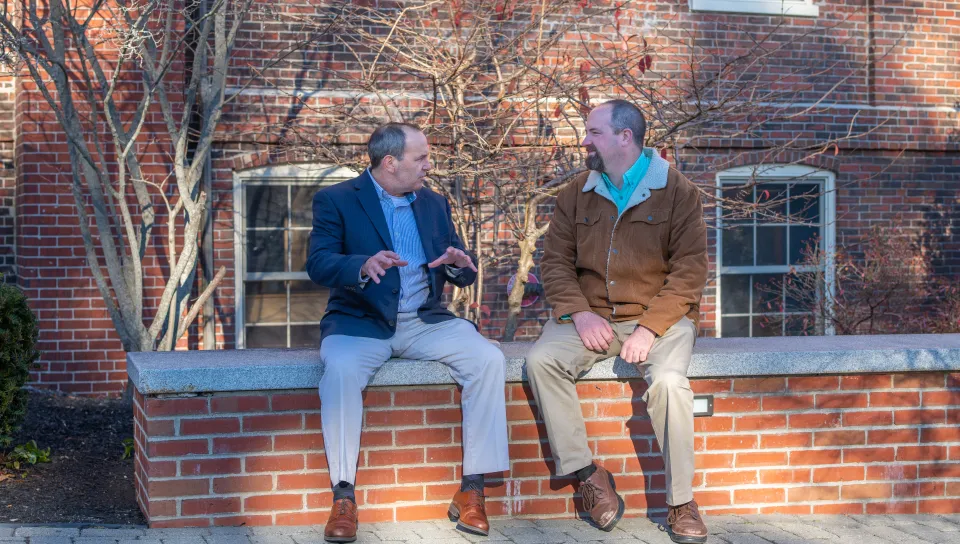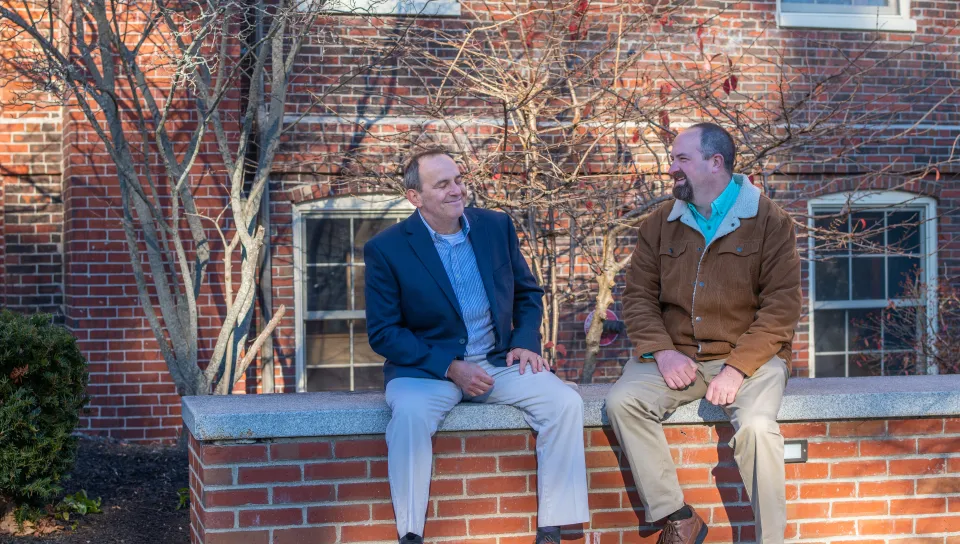
UNE's Christopher Bates-Withers and Michael Smith of Boston University led a rare seminar on firearm safety this fall
Today in the United States, there are 81.4 million adult gun owners, including 24 million who have owned an AR-15-style automatic rifle.
Politics and policy aside, what those big numbers mean, says University of New England Assistant Clinical Professor Christopher Bates-Withers, M.M.S, PA-C, and his colleague Michael Smith, PA-C, at Boston University, is that health care providers need to talk to their patients about gun safety, particularly those who own firearms.
That was the message the two health care instructors delivered in the gun safety seminar they co-led at the annual Maine Academy of Physician Associates Annual Conference this fall in Bar Harbor.
“We wanted to inform this group that may not know the extent of the problem. And that problem is not going anywhere. So, what can we do in the meantime?” said Bates-Withers, the assistant program director of UNE’s Physician Assistant department, which in 2024 was named one of the nation’s top physician assistant programs by U.S. News & World Report.
The two colleagues offered the seminar to help inform Maine’s physician assistants how to talk to patients who own guns about gun safety, the same way they talk to patients about the need to wear a bike helmet, or ski helmet, or a seatbelt.


The two met when Bates-Withers was lecturing at Boston University in 2020 and Smith joined the faculty as an instructor in the Chobanian and Avedisian School of Medicine. When Bates-Withers came to UNE, the two continued to serve as guest speakers in each other’s classes. The idea for the seminar came out of a UNE class Bates-Withers taught this fall that Smith attended, when the topic of firearms came up.
“I misspoke on what you call ammunition — and I'm a gun owner. I just made a mistake,” Smith said. “And Chris came over to me and said, ‘For me, who doesn’t know about any of this, I wouldn’t know how to talk about it.’ Then we started talking about if you're a medical provider who doesn't know guns, how will you talk to a patient who does?”
Smith and Bates-Withers realized gun safety and proper gun handling and storage among gun owners were overlooked topics in medical exams that were important to public health. They decided the wider community of PAs needed to discuss it. They pitched the idea of a gun-safety seminar to the Maine Academy of PAs — and the academy welcomed it.
“We thought, maybe we should get together, collaborate, and talk about it for PAs, just the two of us, who have different points of view, but still respect each other, with the end goal being to help keep our patients safe,” Smith said.
Bates-Withers and Smith are quick to point out they have different world views, or, at least, different politics. Yet they are firmly united in wanting to help patients make healthy choices — including as owners of firearms.
“If you really are trying to take care of patients, you have to subordinate your own perspectives, your own biases, in order to take care of them. And if you can't, you shouldn't be in medicine,” Smith said.
Their presentation included compelling data. According to a recent survey by the Maine Academy of Physician Associates, 47% of the members said they were comfortable talking with their patients about firearm safety. Meanwhile, according to Bates-Withers and Smith, as many as 47% of Maine households contain at least one firearm.
Maine falls roughly in the middle of the pack when it comes to gun ownership, with some other western states having more gun owners per capita — such as Montana (66%) and Idaho (60%), but many other states with far fewer, like Massachusetts (15%) and California (28%).
The two colleagues recommended PAs talk with their patients about how to store and handle a gun properly, and how to find a gun safety course.
“Chris had a great point. He said people don’t want to go to (the National Rifle Association) website to learn about safe gun storage or classes because they may have reasons that they disagree with the NRA,” Smith said.
The hour-long seminar that drew close to 30 ended in robust discussion, yet Bates-Withers said there was not one argument, not one heated discussion, not one raised voice. He credited that calm, supportive atmosphere to the fact the two men share a mutual respect and identical goals as health care providers.
“There were a lot of questions, a lot of very good discussion, too. There were firearm owners in the audience who were very eager to share resources, including the (Maine state) hunter safety course,” Bates-Withers said.